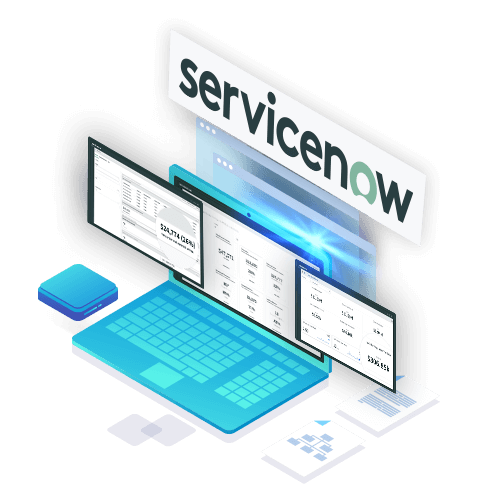ServiceNow IRM Solutions
Streamline Risk, Compliance, and Audit Processes
Home » Technologies » ServiceNow IRM
What is ServiceNow IRM?
ServiceNow IRM (Integrated Risk Management) is a solution created to help organizations efficiently manage their risk, compliance, and audit processes. With a unified platform to streamline risk management activities, enhance visibility, and ensure compliance, organizations can proactively identify, assess, and mitigate risks, improving overall operational resilience.
As a ServiceNow premier partner, we understand how pivotal risk management is for building organizational resilience. Our mission is allowing you to streamline identifying, assessing, and mitigating risk and thus take charge of upgrading your overall organizational risk posture and driving efficiency.

Benefits of Implementing ServiceNow IRM
Enhanced Visibility
As a central hub for all risk data, ServiceNow integrated risk management (IRM) eliminates siloed information and provides a holistic view of potential threats across your organization.
Improved Efficiency
Free your team from repetitive tasks by automating risk assessments, incident reporting, and control monitoring. IRM Servicenow allows you to to concentrate on strategic risk management activities and proactive mitigation strategies.
Automated Compliance
With pre-built workflows and templates for various compliance frameworks, tracking compliances automatically ensures that all regulatory requirements are met and avoids potential penalties.
Risk Management
Enable proactive risk identification through built-in risk scenario libraries and threat intelligence feeds. This allows your team to anticipate potential issues and take preventive measures before they escalate into major incidents.
Ease of Integration
Seamlessly integrate IRM in servicenow with other ServiceNow applications, allowing for a unified risk management approach, leveraging data from various sources for a more comprehensive risk picture.
Scalability
Quickly scale resources with integrated risk management’s cloud-based platform to meet your organization's growing needs. Whether a startup or a large enterprise, it can adapt to your specific needs.
Key Features of ServiceNow IRM
- Policy and Compliance Management: Manage policies, track compliance, and automate policy lifecycles.
- Risk Management: Identify, assess, and prioritize risks across the enterprise.
- Continuous Authorization and Monitoring: Bring IT systems online faster and monitor those systems continuously.
- Regulatory Change Management: Keep up with the changes to regulatory frameworks, guidelines, and best practices.
- Performance Analytics: Anticipate trends and maximize automation for managing compliance.
- Virtual Agent: This intelligent chatbot will help support management overseeing their assets and troubleshooting issues.
- Audit Management: Streamline audit processes and ensure audit readiness.
- Operational Risk Management: Focus on managing day-to-day operational risks.
- Operational Resilience Management: Improve resilience, monitor, and prevent disruption to business operations.
- Use Case Accelerators: Accelerate your compliance journey with access to compliance templates to implement instantly.
- Employee Center: A single hub where one can access information and tools on an easy-to-use interface to support their team better.
- Predictive Intelligence: Pre-emptively act on at-risk assets within your IT environment to find compliance issues and prevent risk.
ServiceNow IRM Pricing Packages
Professional Package
- Core ServiceNow IRM functionalities
- Policy and Compliance Management
- Basic Risk Management
- Limited integration options
- Suitable for small to medium-sized enterprises
Enterprise Package
- All Professional package features
- Advanced Risk Management
- Audit and Vendor Risk Management
- Full integration capabilities
- Business Continuity Management
- Ideal for large enterprises with complex risk management needs
Royal Cyber Offerings for ServiceNow IRM
ServiceNow IRM Assessment
Identify vulnerabilities and enhance risk management. Improve your security framework with our comprehensive ServiceNow IRM assessment.
ServiceNow IRM Jumpstart
Accelerate your Integrated Risk Management implementation with our ServiceNow IRM jumpstart package.
Let’s Talk
Get Started with ServiceNow
Integrated Risk Management
Prevent Risk to Your Enterprise by Getting in Touch with ServiceNow Premier Partner Royal Cyber
Contact Us
1.630.355.6292
ServiceNow IRM FAQs
ServiceNow Integrated Risk Management offers organizations a comprehensive toolset that enhances visibility into their risk and ensures that it aligns with the overall business goals. It encompasses several areas of risk such as reputational, strategic, operational, compliance, and financial risks. With a unified dashboard that provides insight into key risk indicators across the organization, it facilitates executives’ proactive decision-making.
Although ServiceNow GRC and IRM appear to be the same, there are some fine grained differences to consider before choosing:
- IRM (Integrated Risk Management): IRM ServiceNow focuses on all types of risk and compliance management. It provides real-time, integrated view of risk throughout the organization, thus replacing the normally manual, isolated processes of risk management. Thus, IRM enables automation and continuous monitoring, by streamlining risk management across multiple organizational departments and processes.
- GRC (Governance, Risk, and Compliance): GRC covers a wider range including governance. While IRM specifically addresses risk management, GRC ServiceNow can be used in other areas, such as business continuity management.
In short, ServiceNow GRC is the larger umbrella under which IRM can be leveraged.
ServiceNow Integrated Risk Management (IRM) is a subset of ServiceNow Governance Risk and Compliance (GRC) as it only focuses on risk management within the GRC framework.
There are significant differences between integrated risk management (IRM) and enteprise risk management (ERM):
Enterprise Risk Management (ERM) is a more comprehensive approach to managing risks within a company. It considers internal and external risks, strategic objectives, and stakeholder interests. ERM involves identifying, assessing, and prioritizing risks at an enterprise level.
On the other hand, Integrated Risk Management (IRM) is more specific. As the risk management has a defined scope, such as compliance, financial, or operational risks.
To better explain the role of integrated risk management, aka IRM, within an enterprise, here is an example of how it is used within a bank:
IRM in banks allows for the use of data analytics and machine learning to identify and assess risks to a banks’ operations, credit, market, and compliance. By having access to a centralized dashboard banks get real-time insights, along with automated alerts and regular reporting. These capabilities are used for mitigation strategies such as operational controls, advanced credit scoring models, market risk hedging, and compliance programs.
Thus, the IRM framework helps banks proactively managing risks and opportunities within their infrastructure.